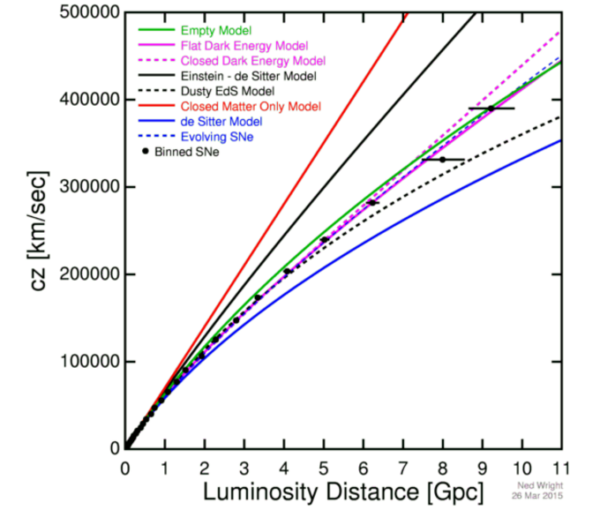“If everything seems under control, you’re not going fast enough.” -Mario Andretti
One of the toughest things to wrap your mind around in the natural world is the idea of special relativity: the faster you move, the closer you get to the speed of light, the more difficult it becomes to increase your speed at all. While you might approach the speed of light arbitrarily and asymptotically, you’ll never reach it.
 Public domain timelapse photo by flickr user comedynose (Pete), illustrating fast, relativistic motion. Image retrieved via https://www.flickr.com/photos/comedynose/23696582553.
Public domain timelapse photo by flickr user comedynose (Pete), illustrating fast, relativistic motion. Image retrieved via https://www.flickr.com/photos/comedynose/23696582553.
And yet, we have the Universe, expanding all the time, where the expansion rate itself is even speeding up. You might wonder, then, if these distant galaxies — the farther and farther away you look — might ever be seen moving away from us faster than the speed of light? Surprisingly and mind-bendingly, the answer is yes.
 Image credit: Ned Wright, based on the latest data from Betoule et al. (2014), via http://www.astro.ucla.edu/~wright/sne_cosmology.html.
Image credit: Ned Wright, based on the latest data from Betoule et al. (2014), via http://www.astro.ucla.edu/~wright/sne_cosmology.html.
Go find out how we reconcile these two seemingly contradictory facts today!

Suppose for a moment that the 1st dimension segways, a line that on 1 end splits into the second, which explodes into a 3rd dimension, the creation of the 3rd creates motion and distance. If the Big Bang was the birth of the 3rd dimension would universal expansion be the 3rd dimension pursuing time at its maximum dimensional expansion rate? It's clear working backwards that higher dimensions must be built off lower dimensions, so it indicates that lower dimensional movement gives rise to the dimension above it by reaching its maximum dimensional expansion limit.
For the 3rd dimension to seguway into the 4th the transition would need to look like motion speeding up to light or beyond.
“So yes, as time goes on, all the objects that are caught up in the expansion of the Universe will accelerate away from us, faster and faster. Let enough time go by, and all of them will eventually wind up receding faster than the speed of light…”
And, of course, we’re one of the objects that are caught up in the expansion of the universe.
So, basically, *everything* will be moving faster than the speed of light.
Are you attempting to make some sort of eschatological point or just down to throwing attention-duds?
"Suppose for a moment that the 1st dimension segways"
It's spelt segue. Yeah, a bit odd, but that's what spelling frequently is in a dynamic living language.
"a line that on 1 end splits into the second, which explodes into a 3rd dimension, the creation of the 3rd creates motion and distance. "
That's called "rotating out of the plane" and is nothing new or explains FTL expansion.
"It’s clear working backwards that higher dimensions must be built off lower dimensions"
So clear it was incapable of being seen as to why.
"So, basically, *everything* will be moving faster than the speed of light."
So, basically, your claim did not follow on from the predicate.
You do not know logic.
The answer to this should be obvious to regular readers.
Spacetime itself is what expands, and at the difference between two sufficiently distant points, the rate of expansion is faster than c. This we observe in the red-shift and the progressive loss of distant galaxies from view.
“It’s clear working backwards that higher dimensions must be built off lower dimensions”
That 1 line is building block for 2, and that motion is a building block for time. Depth doesn't exist with length, and time dosent exist motion. Why would a higher dimension exist without a lower one. If they didn't come to exist at the same time the 1st would have come first, no?
Some quotes [and my thoughts] from a recent article that touches, ultimately, on universal expansion:
“Astronomers have uncovered evidence for a vast collection of young galaxies 12 billion light years away. The newly discovered "proto-cluster" of galaxies, observed when the universe was only 1.7 billion years old (12% of its present age), is one of the most massive structures known at that distance…
Clusters this massive are EXTREMELY RARE: only a handful of candidates are known AT SUCH EARLY TIMES…”
[Amazing, isn’t it, that not only did stars *somehow* form very early in the universe’s life, but galaxies and massive clusters of galaxies, too!?]
………..
“Matter in the universe organizes itself into large structures through the action of gravity…
[But then…]
“The formation and early history of these clusters is NOT WELL UNDERSTOOD.”
[That’s quite a remarkable couplet. It's almost like, well, then how can you claim the first part?]
…………………….
“The prevalence of massive clusters in the young universe can help constrain the size and expansion history of the universe.”
[Instant replay: “The prevalence of massive clusters in the young universe can help CONSTRAIN the SIZE and EXPANSION history of the universe.”
I don’t think I’ve heard that before. Not even from Ethan.]
http://phys.org/news/2016-05-young-mammoth-cluster-galaxies-sighted.html
Um, no. What do you think galaxies are made of?
Hint: Read the title of the paper provided in your link, which is simply uncredited regurgitation of a NOAO press release. Figure out what the missing character is.* Then figure out what the accompanying number for earliest star formation would be.
* Then again, you could also try to find the press release, which doesn't have this error but does have the arXiv preprint.
^ Hint #2: The answer isn't "stars."
^^ Actually, scrap the explicit Population III reference, sorry.
"Not well understood" doesn't mean "we don't know anything about it." It means "there is more to learn."
Hurricane formation was not well understood in 1916, but hurricanes existed, and people knew that they existed and were dangerous. Leavened bread was invented long before people understood the chemistry involved. (Two random examples from very different fields, both of which affect my and possibly your life.)